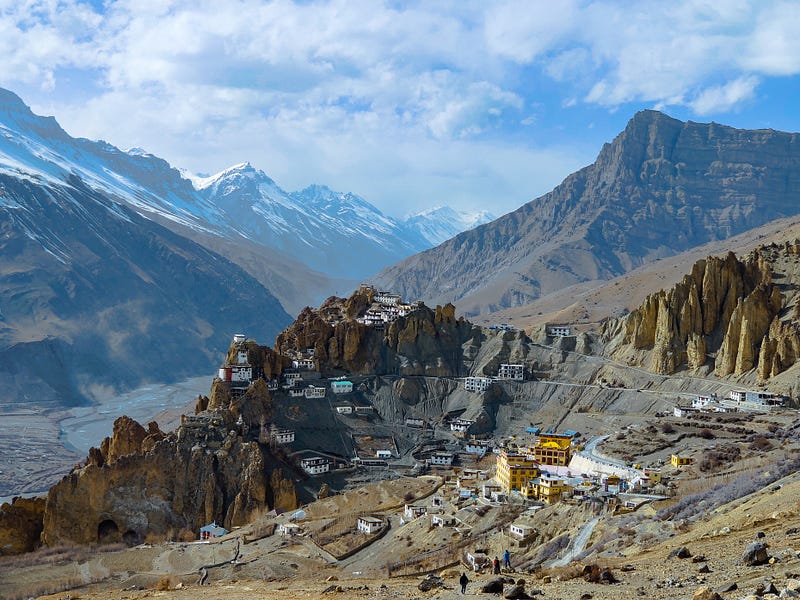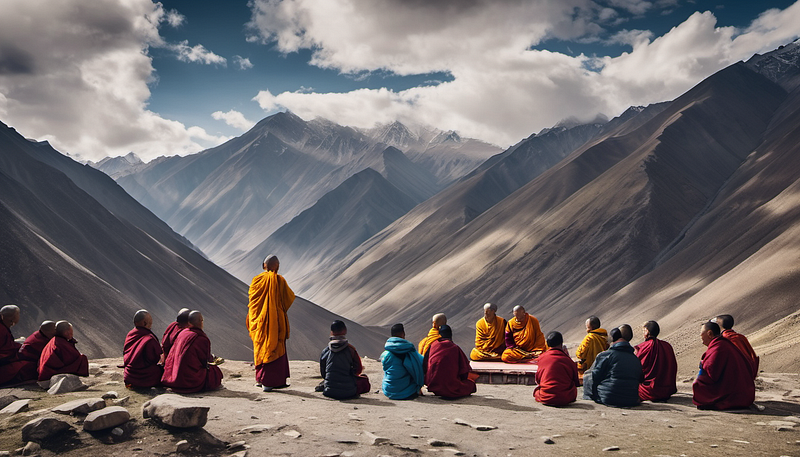Tibet’s Biggest Philosophy Prodigy Found 3 Ingredients For Indestructible Mental Wellbeing
His best student became the first Dalai Lama

There are life-changing trains of thought in what the Buddha taught. You read it once, and reality can’t even be approached the same way!
In Tibet (where 1/4 of all males were monks) a genius was born who decided to read, digest, and summarize the whole library of teachings.
He’s called Tsongkhapa, and his monastic name (Losang Drakpa) means ‘the perfect mind of great accomplishment.’ One particular text of his called three principal aspects of the path is arguably the most potent ever taught by a Buddhist master.
It’s rare even to encounter thinking that can transform our worldview from the root level. Because modernity is obsessed with cheaply watering down Buddhist philosophies, like mindfulness, for corporate purposes.
But taking time to reflect on the following three ideas never fails to attune me to a much deeper purpose. And I hope it does the same for you.
One motivation to rule them all
Most people think Buddhism is about destroying your desires. Total renunciation. But what if that leads only to powerlessness, and is nothing more than a lazy interpretation of a deep philosophy?
Tsongkhapa says that temporary desire for temporary objects is not something that can end. It’s one after the other. Unless (and until) you desire a ‘definite emergence’ out of this stressful mess!
Keeping to this desire of wise escapism doesn’t look like doom-scrolling or evasiveness to what matters in life.
It manifests with you taking full responsibility for what’s under your control.
“Freedoms and endowments are difficult to find and life has no time to spare. By gaining familiarity with this, attraction to the appearances of this life is reversed.”
The path starts with a realization that you’re here to fulfill your eternal longing. Not your itches, urges, and craves.
To notice this longing for permanent happiness, hold to it, and steer it through all the distracting circumstances of life (without ever totally losing it) is a more accurate interpretation of what it means to renounce the lesser for the sake of the higher.
And to reach this higher wellbeing, you need a path.
One heart for all who matter
So, you’ve got an over-arching wish for something more than blind distraction to the whims of body, mind and emotions. You’re situated in your ‘higher self.’
But what do you actually do with all that lower material, which our whole lives are typically caught up in, just out of habit?
You can’t demonize or bypass it, or it’ll rear its head with a vengeance.
And really, how much ‘shadow work’ can you accomplish if we have mountains of behavioral tendencies to cut through?
The best option is to sacrifice it all, by transforming it into a catalyst that operates for the benefit of others.
“The mother whose cherished son has fallen into a pit of fire experiences even one second of his suffering as an unbearable eternity.”
Tsongkhapa says that your psychological well-being, optimized to the level of a Buddha, is the greatest thing you can accomplish in order to help others. And wanting to help others is the only way to become a Buddha!
There’s no selfishness in Buddhahood, nor even a second of inefficiency.
It’s literally the maximization of your potential, done solely out of the purest degree of affection. And guess what? It feels better than any other kind of love you can ever experience.
In Sanskrit, bodhi means wisdom and chitta means heart-mind. According to my own teacher, bodhichitta is ‘the mind that never moves from the thought of benefitting others.’
This is called taking the fruit as the path: becoming Buddha-like even in this very difficult and degenerate world. It’s an active, even desperate embrace of the world, never a rejection of it.
Because what use would your inner liberation be to everyone you’ve ever loved, if it was unable to understand, uplift, and guide them?
This is what most people miss when they skim over Buddhist philosophy: the realization of a Buddha is not the same as his followers. Buddhas arise from the altruistic wish to be of greatest benefit; liberated followers seek salvation.
Don’t just learn to follow, learn to lead, at least for those who need it!
One shovel for the obstacles on the path
So you’re inspired to attain permanent happiness, particularly to benefit others — not just yourself.
But what about the weeds and ferocious beasts waiting to trip you along the dark and desolate stretches of the path?
As it turns out, they never exist in the way they appear to our minds.
Believing our own delusional perceptions is what trips us up, almost every single time.
This doesn’t just relate to the pursuit of consciousness: it’s said to be the Buddha’s description of reality itself. Emptiness.
Not in the sense of nothingness, but that the ideas we hold in our heads, projected onto reality, have no ultimate basis. Everything exists interdependently; we’ve been too lazy or tired to take this in, and ‘summarize’ reality into stories instead.
Which then ensnare us without fail.
“One for whom any object trusted in by the grasping mind has completely disappeared has, as at that time, entered the path pleasing the Buddhas.”
Everything that comes into existence does so due to innumerable causes. The object can’t be separated from that net; it is all interlinked without exception.
When we forget this, and grasp/cling/blame just one segment, delusion is generated, and then suffering, when reality just does not match up.
But when the very arising of a phenomena reminds & points us to its reality as empty of itself (and, perhaps, full of everything else) we free up the energy of unconscious clinging, to then be used for conscious action instead.
We cut out the root of that which stops our ascent: the mind which clings to a potentially infinite number of ‘obstacles.’
We finally get out of our own way!

If you’re confused, chew on some wisdom
I’ll admit it, I’m lost when it comes to Eastern philosophy. There’s just so much to practice, so many traditions, and innumerable texts. In Buddhism itself — what to speak of other lineages of Dharma!
Each effort to learn something is like digging a well, but to reach deep enough requires you do the same effort, again and again.
Distraction, ironically, is more of a problem for me on the path than when I was engrossed in the world.
But ideas like Tsongkhapa’s three principal aspects have had the stamp of approval of innumerable teachers throughout history.
They knew that working on these three, over and over again, is what helps you reach the water.
So may you finally quench the thirst that cannot be sedated away!
May deep fulfillment, beyond desire, be yours.
And when it happens, may this bring great benefit to all beings you come into contact with.
ॐ सर्वे भवन्तु सुखिनः
Om. Sarve Bhavantu Sukhinah.
May all beings experience happiness.
